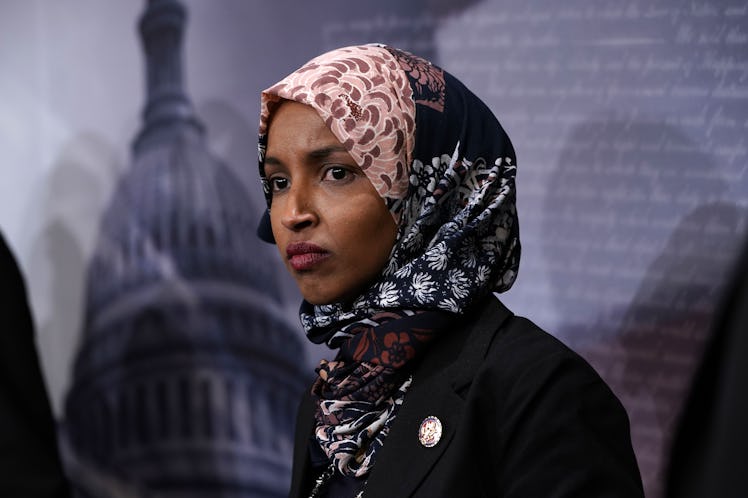
Here's What To Know About The Wild Debate About Ilhan Omar's Comments On Israel
Newly-elected Minnesota Congresswoman Ilhan Omar's recent tweets about Israel, lobbying, and the American Israel Public Affairs Committee (AIPAC)have generated fervent debate online about anti-Semitism and the role of lobbying in American politics. And oh boy, is this complicated. So don't feel bad if you're asking yourself questions like, what is AIPAC? Because Ilhan Omar's tweets about the organization have sparked discussions and disputes.
In short, AIPAC is a pro-Israel lobbying group in American politics, with a mission to "strengthen, protect and promote the U.S.-Israel relationship in ways that enhance the security of the United States and Israel," per the AIPAC website. The organization, which describes itself as bipartisan, cites its achievements in promoting U.S.-Israeli defense initiatives, negotiating peace between Israel and other Middle Eastern Nations, and forwarding joint research projects between the United States and Israel. What it is not, per its site, is a political action committee (PAC), and it does not contribute funds to political candidates directly, per campaign finance tracker Open Secrets. However, it is recognized as a politically influential organization.
The organization is currently at the center of a controversy started by tweets posted by Omar, who suggested that AIPAC was essentially paying politicians to promote pro-Israel policies. The Twitter conversation around AIPAC started on Sunday, Jan. 10, when Omar quote-retweeted a post by Intercept journalist Glenn Greenwald, who had commented on political condemnation of how Omar spoke about Israel. "It's all about the Benjamins baby," Omar wrote in response, implying that money pays a powerful role in American support of Israel. Later, Forward Opinion Editor Batya Ungar-Sargon tweeted, asking, "Would love to know who @IlhanMN thinks is paying American politicians to be pro-Israel." Omar responded with a quote that read simply, "AIPAC!" in another tweet.
Many on social media saw the comment — and particularly the suggestion that money was behind American politicians' support for Israel — as based in anti-Semitic conspiracy theories, particularly ones suggesting that rich Jews control the world. Omar's critique of AIPAC spurred an immediate response from politicians, public figures, and organizations on Twitter, including AIPAC itself. A tweet from AIPAC said, "We will not be deterred in any way by ill-informed and illegitimate attacks on this important work." Elite Daily reached out to AIPAC for additional comment but did not immediately hear back. Omar later tweeted out an "unequivocal" apology on Feb. 11.
Among the voices concerned about Omar's tweets was Chelsea Clinton, who wrote, "We should expect all elected officials, regardless of party, and all public figures to not traffic in anti-Semitism."
A statement issued by House Speaker Nancy Pelosi on behalf of Democratic Leadership criticized Omar's use of "anti-Semitic tropes and prejudicial accusations about Israel’s supporters."
Though some people like Ungar-Sargon, Clinton, and Pelosi opposed Omar's comments, others jumped to her defense against claims of anti-Semitism, saying that criticism of Israel and its political action wasn't the same as anti-Semitism.
Huffington Post reporter Ashley Feinberg tweeted that "accurately describing how the Israel lobby works is not anti-Semitism."
Lucas Fleischer, a Jewish creative director who has worked with the Democratic National Committee and Obama for America tweeted, "I have serious problems with @AIPAC and the Israeli government's treatment of Palestinians."
Mehdi Hasan, a contributing editor at New Statesman and an adjunct professor at Georgetown University added that it shouldn't be "off limits to mention money and support for Israel."
On Monday, Feb. 11, Omar tweeted a statement in response to the backlash about her original comments. Her caption was "Listening and learning, but standing strong."
In the statement, she expressed gratitude toward her Jewish allies and colleagues who were educating her on "the painful history of anti-Semitic tropes." Omar said she she "unequivocally" apologized for her comments. However, she also reaffirmed "the problematic role of lobbyists in our politics," and cited examples like the NRA, the fossil fuel industry, and AIPAC.
It seems like everyone has an opinion, and this is complicated. We'll have to see where it goes from here.